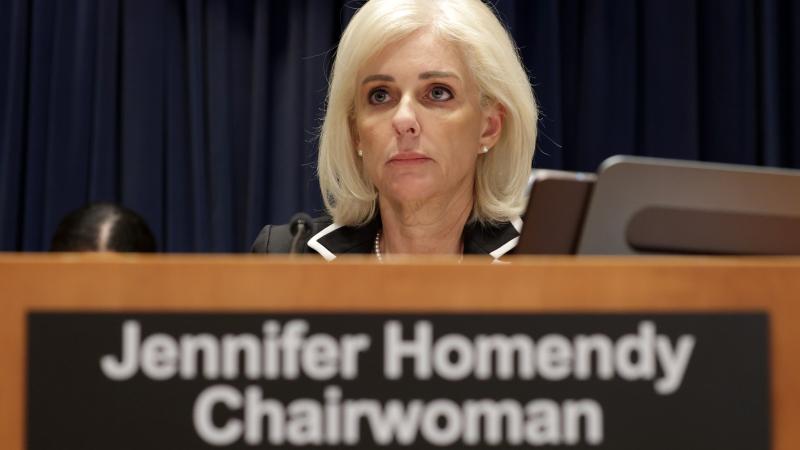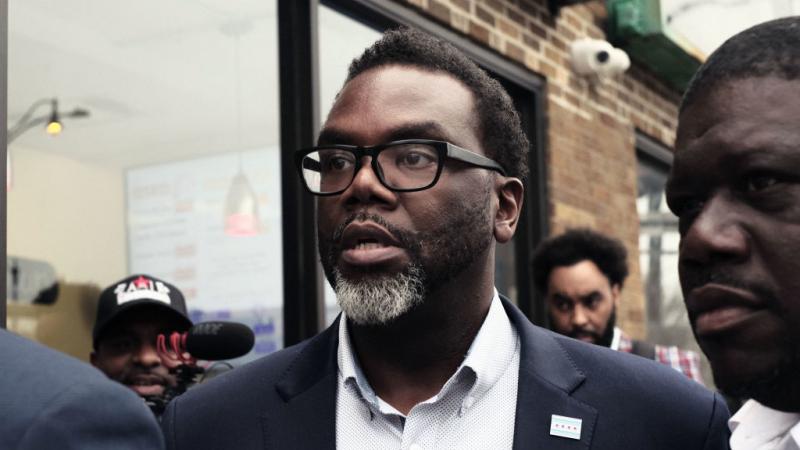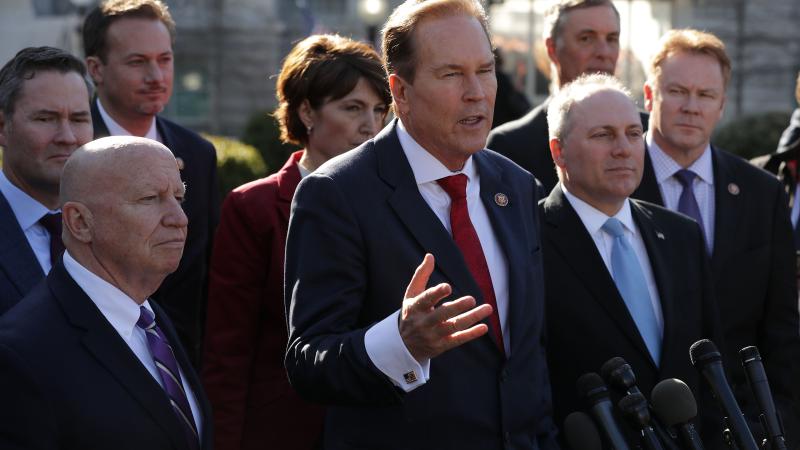Trump-favored Oracle 'enabling' hospitals in hiding kids' gender procedures from parents: report
Oracle and Epic control nearly two-thirds of electronic health records market, and "may be enabling – or even reinforcing – restrictions on parental rights through the way these systems are marketed and customized for clients," Do No Harm warns.
As parents fight school districts in the courts to disclose when their children express gender identity at odds with sex, allied with a transgender child psychologist who has repeatedly urged judges to clue in parents, they face a lesser known roadblock to transparency about their children's health: electronic health record systems that lock them out.
A report by medical advocacy group Do No Harm said "it appears that healthcare systems are using sexually transmitted infections, mental health concerns, and drug and alcohol exceptions" in the Health Insurance Portability and Accountability Act's privacy regulation "to remove parental access to their child’s entire medical record – well beyond the limits of the law."
The report speculates that hiding so-called social transitions and other gender-affirming interventions are "possible catalysts for many of these proxy access policies," which withhold from parents the medical notes from adolescents' doctor visits, among other categories.
Epic and Oracle Health, which together control nearly two-thirds of the hospital EHR market in the U.S., are leading the way in facilitating the concealment of gender-affirming practices for adolescents, according to the report, which gives case studies from EHR systems in both red and blue states.
EHR vendors "may be enabling – or even reinforcing – restrictions on parental rights through the way these systems are marketed and customized for clients," Do No Harm director of programs for gender ideology Michelle Havrilla and medical director Kurt Miceli wrote.
Just the News asked each company whether the design of their EHR systems could induce customers to make unlawful decisions. A 9th U.S. Circuit Court of Appeals precedent against a roommate search engine stripped its statutory liability shield for requiring users to state preferences in violation of antidiscrimination law.
"Epic does not determine parental access to children’s medical records" but simply provides options to customers in every state, a company spokesperson told Just the News.
"Because state and local laws vary, our software is highly configurable so that our customers can meet their specific compliance requirements," the emailed statement reads. "Decisions about parental access to children’s medical records are not made by Epic. These decisions are made by our customers."
Oracle, whose 2022 acquisition of Cerner created Oracle Health, announced "next-generation EHR" using "AI-fueled intelligence that is contextual and conversational" this summer.
The company is close to the White House by way of founder and Executive Chairman Larry Ellison, a major President Trump ally and Republican donor. His son David Ellison leads the newly merged Paramount Skydance, granted FCC approval after Paramount settled Trump's lawsuit alleging deceptive editing by "60 Minutes," a news program by CBS whose parent company is Paramount Global.
Oracle is also a new part-owner of a TikTok spinoff and will control its algorithm in the U.S., enabled by Trump's constitutionally questionable delays of the congressional ban on the Chinese-owned social media app, upheld by the Supreme Court days before his inauguration.
Oracle corporate and Oracle Health spokesperson Misti Preston did not answer queries.
'Cognitive capacity' to deal with broken bone at ER without parents?
Longstanding Supreme Court precedent gives parents the authority to make medical decisions for their children, including for mental health-related conditions such as gender dysphoria, except in narrow circumstances.
U.S. District Judge Roger Benitez certified a class-action suit against California's so-called gender secrecy practices in public schools last month. He earlier denied motions to dismiss by saying the "significant, adverse, life-long social-emotional health consequences" that can flow from social transitioning legally require parental involvement.
Do No Harm's report echoes the judge's language. "Adolescents simply do not have the cognitive capacity to make these difficult decisions" about medical care, such as a 13-year-old visiting the emergency room for a broken bone, without parental notification.
Asked whether the group was accusing EHR providers or hospitals of unlawful conduct, Miceli told Just the News that restricting parental access "beyond what federal and state laws permit undermines both parents’ responsibilities and their legal rights as their child's designated personal representatives."
He cited what Texas Attorney General Ken Paxton called a "first-of-its kind agreement" with Austin Diagnostic Clinic last month to stop restricting parental access to their children’s EHRs at age 12, giving parents "full, real-time access" except for portions "specifically restricted by state or federal law."
"Vendors should not promote blanket restrictions that exceed legal boundaries, nor should hospitals and clinics permit their implementation," Miceli said.
The design and implementation of EHR systems related to parental rights may draw scrutiny from other red states and the Trump administration, months after the Supreme Court upheld Tennessee's ban on gender-affirming treatment for minors as an appropriate state regulation of medicine.
The administration's Department of Health and Human Services did not respond to a query Friday for its response to the report.
Australia's Queensland government is facing a more convoluted path to pause puberty blockers and cross-sex hormones for gender-confused adolescents, following the lead of both Liberal and Conservative governments in its commonwealth sibling U.K.
Six hours after Supreme Court Justice Peter Callaghan lifted the nine-month-old pause by health director-general David Rosengren, on the grounds that it was imposed at the direction of health minister Tim Nicholls and lacked "adequate consultation," Nicholls issued his own directive reinstating the ban, the Australia Broadcasting Corp. reported.
Callaghan explicitly acknowledged Nicholls had his own power to pause treatment in Queensland hospitals and health services, "if he is satisfied it is necessary to do so in the public interest" and he issued the direction "in writing and published in a way that allows it to be accessed by members of the public."
Nicholls' pause applies only to new prescriptions for "Stage 1 and stage 2 treatment," for blockers and hormones, under age 18, while the Queensland government awaits the results of an independent review in November, ABC reports.
Tween must call provider to reinstate parental access
Do No Harm's report builds on a 2022 review of the wide variability among state laws on "adolescent privacy," which did not directly consider gender identity. Published in the American Academy of Pediatrics' flagship journal, the review noted some states let adolescents only hide certain kinds of information from parents, such as STIs or substance abuse.
The switch to EHRs has worsened limitations on proxy access to children's medical records, preventing parents from "accessing critical health information about their child that would otherwise be legally permissible," especially from ages 12-17, Do No Harm's report says, including examples from proxy access and "confidential workflow" forms.
The only exceptions to the HIPAA privacy regulation's assignment of the parent as a minor's personal representative are when the minor consents to care and applicable law does not require parental consent, "the minor obtains care at the direction of a court or a person appointed by the court," and when the parent agrees to the "confidential relationship" with the provider.
The "adolescent medicine" movement advocates the exclusion of parents from increasing parts of children's medical records, according to Do No Harm, citing Children’s Mercy Kansas City adolescent division Director Ryan Pasternak, who called it "a serious safety issue … depending on how their parents feel" about their children's behaviors.
Pasternak coauthored the Society for Adolescent Health and Medicine’s EHR recommendations for adolescents, which emphasize "vigorous protection of confidentiality" for adolescents and only imply they have parents in a section on teaching "families" how to use EHRs.
He and adolescent medicine specialist Kirsten Hawkins at D.C.'s MedStar Georgetown University Hospital detailed in a Contemporary Pediatrics article how clinics work with their IT departments to exclude parents.
This includes setting an age for adolescents to automatically become the owner of their patient portal, withholding "specific labs" and visit records, configuring the EHR to "trigger a warning" when adolescent notes are accessed and turning off portal access in "sensitive" periods.
Epic uses a standardized "Sexual Orientation and Gender Identity (SOGI) smartform" to categorize those patient identities, typically completed at each visit, and takes an "organ inventory" since the patient's "current anatomy" may differ from "legal sex," the report says, citing an Epic EHR screenshot from the University of Pittsburgh Medical Center.
It tells parents who are unable to see their children's "MyChart account" that each organization using Epic "has their own interpretation of federal legislation that guarantees privacy rights to adolescents" and determines which age to limit or remove proxy access.
Public details on Oracle Health's EHR are more sparse, though its help page for British Columbia's healthcare system shows how to document gender identity, pronouns and preferred name under "social history," and its default protected age is 13, the report says.
To "advance gender-affirming healthcare," Oracle recommends mandatory fields for "chosen [preferred] name" and "given [legal] name" and "dropdown options" for gender identity and "sex assigned at birth," while suppressing given name and birth sex "when possible."
Florida's Lakeland Regional Health, using Oracle's EHR, automatically removes proxy access at age 13 and requires the child to call to reinstate parental access, while UF Health Shands Hospital, using Epic, gives children starting at 12 "independent access to their medical records" and requires parents to request access.
Georgia's Wellstar Health System, using Epic, limits parental access to viewing immunizations and scheduling appointments starting at 12 and also requires the child to authorize expanded access.
North Carolina's CarolinaCARE, using unknown EHR, cuts off parental access to prescription information at 12 so children can receive "sensitive" prescriptions, while Epic-using UNC Health locks out parents at age 13 unless they can demonstrate their child has "diminished capacity or a medically complex condition."
Washington's Woodcreek Pediatrics at Mary Bridge Children’s, citing state law, says it cuts off all parental access at 13 except for "immunization history and growth chart data."
The Facts Inside Our Reporter's Notebook
Videos
Links
- parents fight school districts in the courts
- repeatedly urged judges to clue in parents
- A report by medical advocacy group
- 9th U.S. Circuit Court of Appeals precedent
- announced "next-generation EHR"
- granted FCC approval after Paramount settled
- new part-owner of a TikTok spinoff
- control its algorithm in the U.S.
- constitutionally questionable delays
- certified a class-action suit
- He earlier denied motions to dismiss
- both Liberal and Conservative governments
- Australia Broadcasting Corp. reported
- 2022 review of the wide variability among state laws
- Ryan Pasternak, who called it "a serious safety issue
- EHR recommendations for adolescents
- Contemporary Pediatrics
- help page for British Columbia's healthcare system
- default protected age is 13
- "advance gender-affirming healthcare














